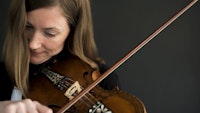Field of study: Performance Practice
Mathias Gillebo: To Sing Reality

To what extent and how are the ethical and political implications in singing? - Singing as Ethical Demand and Public Political Discourse.
Summary
The dissertation takes as point of departure an experience of urgency when singing, that something is constituted, something is at stake and demands something of me, as I use my voice. I explore this performative urgency by asking the overarching research question: To what extent and how are there ethical and political implications in singing?
The dissertation has four main sections: First an introduction of the main topics (Goehr, Adorno, Street) and research questions. Second, a theoretical contextualization of pertinent strands of research, especially concerning the performative turn in music research (Austin, Schechner, Fischer-Lichte, Cook), followed by a presentation and assessment of the theoretical framework and concepts within which I will explore my own singing performance, especially semiotics (Kristeva, Barthes, Adorno, Rolvsjord), liturgy (Pickstock), ethics (Løgstrup, Jonas) and the public sphere (Habermas, Rancière). Third, a methodological discussion concerning case study research based on my own singing performance (Leavy, Flyvbjerg), followed by an analysis of five interviews of two groups attending the concert productions. Fourth, a discussion based on the findings in the analysis referenced within the theoretical framework.
The discussion takes as point of departure a metaethical view that human action, expression and relations are immersed in given ethical conditions we neither choose nor produce. Reality is conditioned by an ethical demand between acting subjects. On the basis of the findings in the analysis of the empirical material, I discuss the implications of this ethical demand on the act of singing as an event taking place on three interrelated levels: 1) in the use of voice as constituting subject and meaning through sound and/as language, 2) in the intersubjective relation between singer and audience established, addressed and changed by the act of singing, and 3) in the dynamics through which the singer-audience-relation occurs in the public sphere as discourse.
The main objective of the dissertation is the attempt to explore to what extent and how there are ethical and political implications in the act of singing. The significance of this attempt is presumed to be a proposal of the potential of singing as a practice that, through its exposure of the humanity of performer and audience, can contribute to a theoretical and methodological legitimation of singing as participation in ethical-political discourse in the public sphere, widen our notions of what constitutes such a participation, and advocate an artistic professionalism which sees such a participation as integral to the artistic practice.
Alongside his PhD project, Mathias Gillebo is an active opera and concert singer. He is also educated as a theologian.
The dissertation
The dissertation is titled To Sing Reality. Singing as Ethical Demand and Public Political Discourse.
The dissertation is a monograph, written in English.
Articles relevant
Published: Apr 24, 2018 — Last updated: Dec 18, 2025

